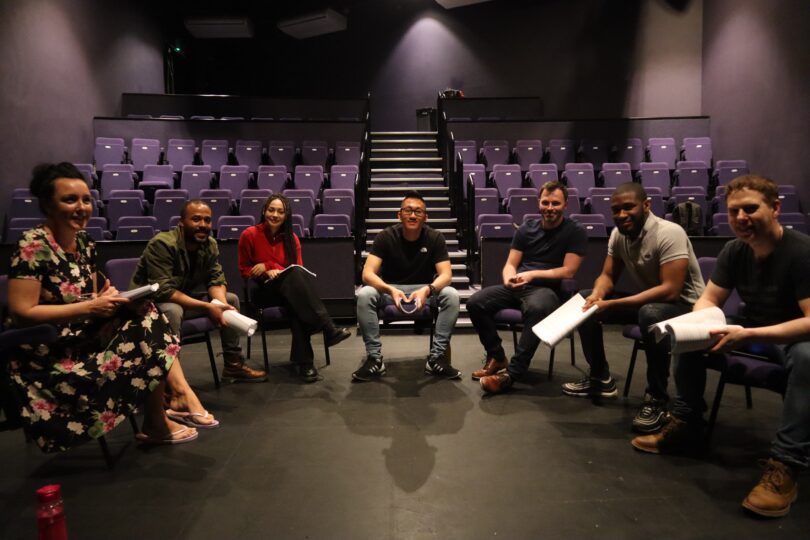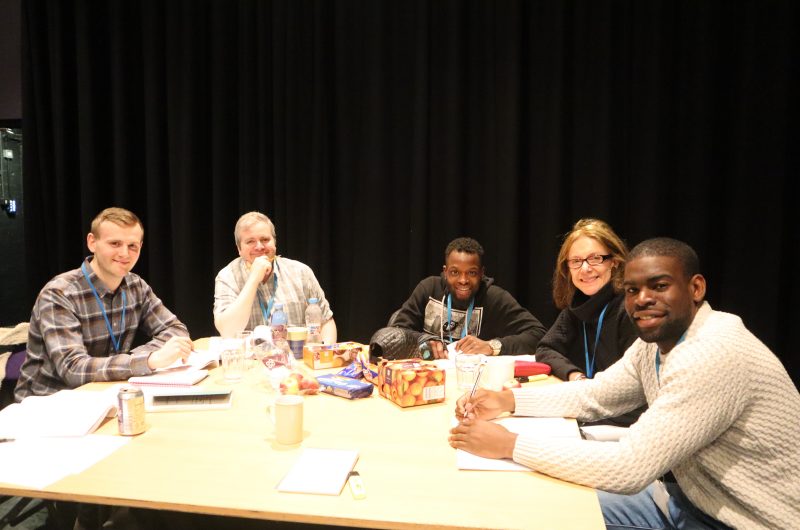
The Mercury Theatre recently presented the two winning entries for the Mercury/Weinberger’s Playwriting Prize.
The first was Target Man, winner of the Future Voices Category, written by Mark Starling. Target Man is an imagining of the myriad implications to identity and status in the world of professional football, when players come out as gay – something which, as of the play’s writing, has not happened at an elite level. The second play was Screaming Heart by Joe Ward Munro, which was the overall winner of the competition. Screaming Heart also speaks towards identity politics, but within a dystopic and post-racial world beset by an unknowable violence. In that world, a group of teenagers struggle to live within the confines of an oppressive and occupying militarised state.
The two readings were performed by two companies of professional actors – who had two days to rehearse beforehand – before an audience in the Mercury Studio. Both plays were sharp, spare and loaded, with very different but nevertheless equally resonant concerns. Both Mark and Joe are substantial theatrical voices, and their work was brought to life by very committed casts, eager to give the scripts the value that they merit.

However it occurs to me that, whilst within the culture of professional theatre play readings are commonplace, they are often inward facing events and, for most people, a play reading – as opposed to a production – might, itself, seem slightly unusual. Hence I have written a few words in an attempt to explain what they are, and what they are for.
Play readings are an important part of both the production and artistic economies of making new work, and in many respects have their own peculiar qualities and modalities that mean they sit apart from reading a script, and apart from watching a piece of theatre. Furthermore this extends to putting play readings together as well: to perhaps an unexpected extent they require a set of skills – acting, writing, and directing – that are applied uniquely for this particularly necessary, but also idiosyncratic format.
For those of you that have never been to a play reading, or staged or rehearsed reading as they are sometimes called, they are in a sense exactly what they say they are: a performance of sorts, of the play, whereby actors, working script-in-hand, and more often than not remaining seated throughout, read a play to an audience. The reading is rehearsed in the sense that the actors will have worked on the play – most likely with a director and the writer – in the preceding hours or days; and they will have, by the time that the play is presented, a sense of how they will ‘perform’ it.
But in a deeper sense, a rehearsed reading is un-staged, and the actors are coming at the script without the weight, or responsibility of a rehearsal period behind them. Ideally the audience know this too, so there is a kind of quiet pact being made between audience and performer: both parts of that equation understand the slightly fertile and fervent nature of the work – fervent and fertile in the sense that the actors don’t quite know what will happen, and the audience know they don’t quite know. I suppose it is somewhat akin to being let into a rehearsal room at an early stage to see what’s going on – exciting but risky.
Now within the life-cycle of an unproduced play, a rehearsed reading can be a really important moment, as it allows potential audiences, producers, and often most significantly the writer themselves, to have the play worked on, and exposed, in reasonably safe conditions, as part of the journey towards production. Indeed, as a consequence of readings, writers re-write, often quite extensively; whilst producers gain a clearer sense of what a particular play could be. As such a play reading is a multiple operation in imaginings – all parties are asking themselves, what if? What could this be if it was produced?
From the point of the view of the actors, one therefore has a very particular job to do in the frame of the rehearsed reading. Most of the time, one will not be ‘up on one’s feet’ and moving around (there are exceptions), hence the actor has to primarily limit their behaviour to their voice, which when you think about it, is really only one tool of many that they would ordinarily have to communicate.
Yet this actually speaks to the role of the actor in the reading format: to make the text of the play clear. A play reading, in a way that is perhaps theatrically unique, is designed to remove any barrier or theatrical misdirection from the play-text itself, so that it can be ‘read’ (in every sense) as clearly as possible.
It is because of this, that acting in, or directing readings, is actually very hard – not all the instruments in one’s orchestra are available to you; one is working very fast and one has a very particular goal. All that being said, readings can also be very exciting to produce and to see, precisely because they are not bound by the obligations of full production. They still contain the questions-yet-to-be answered, and that can be thrilling. It is like getting in on a secret adventure before anybody else knows – coming in on the ground floor for something that has the potential to be massive. An audience for a reading, might, might, just see something that in the months or years ahead, becomes hugely successful and significant. At which point you might be able to say – “ah, I was there at the very beginning!”
Dan Sherer
Associate (New Work & Talent Development)


